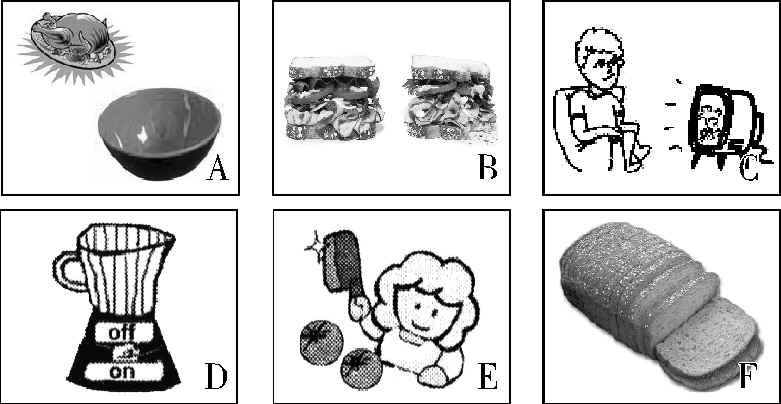
_________ fruit do we need?
A. How many B. How much C. How far
B
解析试题分析:此题考查how many,how much和how far的区别。How many是用来询问可数名词的量,how much用来修饰不可数名词的量,how far是用来询问距离。根据语境可知此句的含义是我们需要多少水果?是用来询问名词的量,因fruit是不可数名词,故用how much来修饰,故选B。
考点:how many how much,how far的区别
点评:以how引导的短语很多并且是考查的重点,常用的有:how often”多长时间一次”对在某一特定的时间内进行的动作次数进行提问,其答语一般为“never sometimes usually”等频率副词。 how long“多长时间一次”是询问动作持续的时间,答语通常是表示时间的状语(two weeks等)前面一般跟介词for;有时也可以表示长度。how far “多远” 一般指的是一地到另一地的距离how many 和how much 均可表示“多少”how many 修饰可数名词的复数形式,而how much 修饰不可数名词,还可以用来询问价格。


 53随堂测系列答案
53随堂测系列答案科目:初中英语 来源:2008年新目标英语八年级Unit 7同步验收“四级跳” 题型:001
Ⅰ.听句子,选出与其意思相符的图画(有一项多余)

1.________ 2.________ 3.________ 4.________ 5.________
Ⅱ.听录音,补全对话
M:Gina, do you know (1)________ make fruit salad?
W:Yes, I do.
M:Let’s make fruit salad.
W:Good idea! Emm…first (2)________ three apples and a piece of watermelon.Do you like bananas in salad?
M:Yes, I do.
W:OK, (3)________ and then cut them up.
M:What can I do next?
W:(4)________.
M:OK.How much sugar do we need?
W:About two teaspoons and a cup of yogurt.
M:Now, (5)________, then we can eat it.
Ⅲ.听短文,选择正确答案
1.The iced coffee bought at a cafe will often be ________.
A.the ice cream kind
B.coffee only
C.the ice-only kind
2.If you want to make good iced coffee, you just need ________.
A.coffee, milk and ice cream
B.coffee, ice and milk
C.coffee, milk and cream
3.If you wish, you could add some ________ into the black coffee and mix well.
A.milk
B.ice cream
C.sugar
4.Put ________into the glass and fill up the rest of it.
A.coffee
B.ice cream
C.only ice
5.Which is the last step?
A.Fill a big glass with some black coffee.
B.Pour milk over the top and mix it well.
C.Put some ice cream on the top.
查看答案和解析>>
科目:初中英语 来源:2012-2013学年江苏省南京市白下区中考二模英语卷(解析版) 题型:其他题
There once was a master who went to India. He had never been there before. When he got there, he saw a lot of f 1. . In India they have plenty of fruit to sell, but much of it is expensive b 2. they can’t grow much as a result of the water situation. He saw a big basket of some very red, long fruit. And it was the c 3. in the shop, not expensive at all.
He went up and asked,“how much per kilo?”“Two rupees.”Two rupees in India is almost
n 4. ; it’s like dirt (尘土). So he bought a whole kilogram of it and started eating it. But
a 5. he ate some of it: Oh, my god! His eyes watered, his mouth watered and burned, his eyes were burning, his head was burning and his face became red. He jumped up and down, saying,“Ah! Ah! Ah!”
But he s 6. continued to eat! Some people looking at him shook their heads and said,“You’re crazy. Those are chilies (辣椒)! You can’t eat them like that. They’re not fruit!” However, the master said, “No, I can’t stop! I paid money for them, and now I’ll eat them. It’s my money!”
You may think that master was s 7. , right? Similarly, we sometimes do a lot of things
l 8. that. We devote money, time or effort to a relationship. Even though the suffering experience tells us it won’t w 9. , and we know there’s no hope things will change in the future—we still continue just because we’ve devoted money, time, effort and love to it. Just like the man who ate the chilies and suffered so much but couldn’t stop.
So even if you’ve lost something, let it g 10. and move on. That’s better than continuing to lose.
查看答案和解析>>
科目:初中英语 来源:同步题 题型:填空题
查看答案和解析>>
科目:初中英语 来源:同步题 题型:填空题
查看答案和解析>>
科目:初中英语 来源:同步题 题型:听力题
查看答案和解析>>
湖北省互联网违法和不良信息举报平台 | 网上有害信息举报专区 | 电信诈骗举报专区 | 涉历史虚无主义有害信息举报专区 | 涉企侵权举报专区
违法和不良信息举报电话:027-86699610 举报邮箱:58377363@163.com